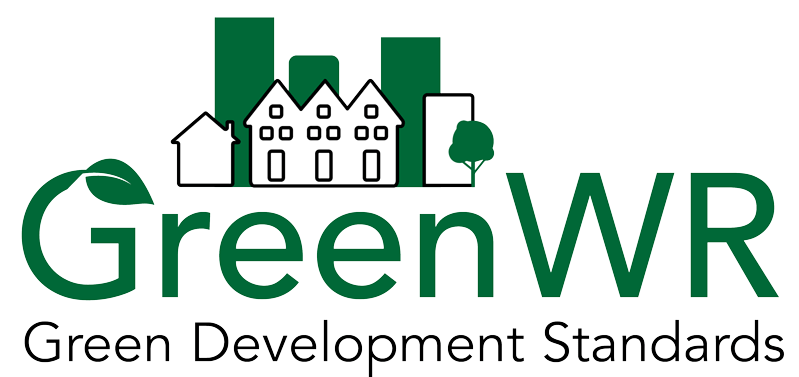An organization to promote Green Development Standards
There are many environmental and sustainability groups in Waterloo Region that are involved in various diverse areas: climate change, protection of ground water, urban sprawl, preservation of farmland, sustainable communities, and energy efficient housing.
greenWR.org has been organized to promote Green Development Standards as a means of combining the concerns of these groups into one voice.
The Region of Waterloo Official Plan is designed to direct future growth in the Region. Among other things, it fixes the border between rural and urban areas, directs growth to make better use of services, and protects drinking water and significant environmental areas [1]www.regionofwaterloo.ca/en/doing-business/Regional_Official_Plan.aspx.
The Ontario Building Code includes standards for public health, fire protection, structural integrity, energy conservation and barrier-free access to buildings [2]www.ontario.ca/document/ontario-municipal-councillors-guide/11-building-regulation.
Neither the the Regional Official Plan or the Ontario Building Code define how communities are built to be sustainable. Green Development Standards go beyond the Official Plan and the Building Code to provide an integrated approach to reduce Greenhouse Gas (GHG) emissions, protect natural resources, and create a thriving community.
The reduction of GHG emissions must include:
- reducing the use of fossil fuels by building energy efficient houses
- planting trees to provide shade to further reduce the energy required for air conditioning
- reducing the need to travel for work, recreation and entertainment
The protection of natural resources must include:
- porous cement or asphalt for parking lots and drive ways to allow storm water to enter the ground
- vegetation buffers around streams to reduce flooding
Thriving communities must include:
- walk-able neighbourhoods
- local school, stores, restaurants and services that minimize the need for a vehicle.
- parks and green space
Green Development Standards
Land use decisions are some of the most critical for a safe climate future because the impacts on greenhouse gas emissions extend for generations and decades/centuries into the future. Given the global climate emergency, the predicted increase in Canada of fires, floods, extreme weather and associated risks to ecosystems, human health and the economy, updating Ontario’s Building Code with measures to mandate net zero construction of all types of buildings and infrastructure is urgently required.
A commitment to increase the level of harmonization of our provincial building code with the National Construction code beyond the current 60% is laudable, but Ontario has an opportunity to be a leader in implementing Green Development Standards. There are several available for reference: International Green Construction Code, ANSI/ASHRAE 189.1 Standards, the US National Green Building Standard, Green Globes Certification, LEED – Leadership in Energy and Environmental Design Standards, and the Living Building Challenge Certification.
For too long the construction industry has been competitive by adhering to building code minimums. The lowest common denominator strategy leaves us with buildings being constructed today that commit society to increasing emissions going forward, during the life cycle of these buildings. This practice must stop now. Reaching Canada’s climate target of net zero by 2050 and more critically COP 26 “keep 1.5 alive” (1.5 degrees centigrade by 2045-50) requires urgent action with real outcomes.
This is a time for ambition, creativity and courage. This is not business as usual and reliance on what is thought to be acceptable by the industry and realistically achievable. All of us including the construction industry, policy makers, planners, elected officials at all levels and the general public must be challenged and inspired to work harder, reach higher toward a bolder vision. Our task is to set in place standards that call for leadership, incentivize innovation and collaboration and reward net zero outcomes and Green Development Standards.
The well-being of our children, resilience of our communities, and economic sustainability depends on decisions we make now across all sectors of our society. Green Development Standards and enhanced building codes will be critical for the climate resilient development, for which the IPCC advocates.
Next Steps
“The Municipal Act allows municipalities to pass environmental protection and conservation by-laws. It also allows municipalities to participate in long-term energy planning for energy use in their community.” [3]www.cleanairpartnership.org/wp-content/uploads/2021/10/Municipal-Green-Development-Standards-Final.pdf
we plan to work with the Region of Waterloo and all area municipalities to insure that:
- restrict the approval of all new building permits so that all new buildings meet Net Zero standards.
- restrict the approval of all new building permits so that all renovations meet Passivhaus standards.
- require all building permits to estimate the amount of embodied and emitted carbon.
